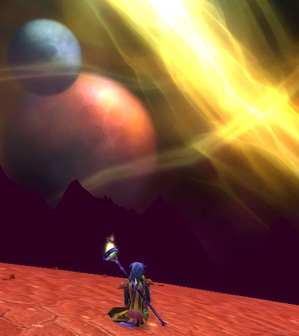
Current Findings
- Playing WoW Improves Older Adults' Cognition
Tuesday, June 16, 2009
We recently conducted a pilot study using a sample of 14 older adults (7 men, 7 women) with an average age of 69 years (SD = 4.68; aged 63 to 73 years) all of whom owned their own personal computer. Participants completed a pretesting session that included measures of processing speed, executive functioning, mental rotation, after which they completed a two-hour WoW training session where they learned the basics of WoW game play. Participants were then given a copy of World of Warcraft to install on their computer and instructed to play the game for at least 14 hours over the next 14 days. After two weeks of play time ranging from 6.32 to 33 hours with an average of 15 hours (SD = 8.05 hours), participants returned for a posttest session and we found that it improved their performance significantly on a number of cognitive tests. Specifically, significant pretest to posttest improvements were found for tests measuring executive functioning, spatial ability, thinking speed, basic memory, and everyday memory.
To determine if greater engagement or involvement in the game was associated with individual differences in pretest to posttest gains, data on the highest level obtained and number of quests completed was also collected. "Levels" in WoW are earned through earning experience points and exploration and therefore serves as a useful measure of "in game success" or involvement. As players gain levels they open up new areas to explore and are given new skills to learn and master. Quests are in game tasks that players receive and are typically cognitively challenging. Analysis revealed that for participants that completed at least 11 quests compared to those that did not, performance gains were marginally greater for the executive functioning task and significantly greater for thinking speed. In sum, findings from our pilot studies provide empirical support that: (a) older adults are willing and motivated to play WoW and that (b) the WoW intervention shows gains in cognitive performance; gains were stronger for the most engaged participants, (c) more engagement or involvement with the game may be associated with greater gains, and (d) these gains extended to a real-world measure of everyday memory.